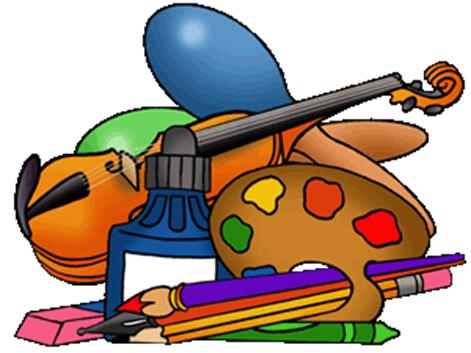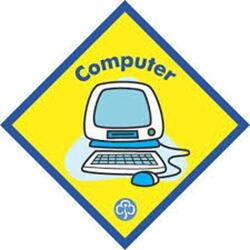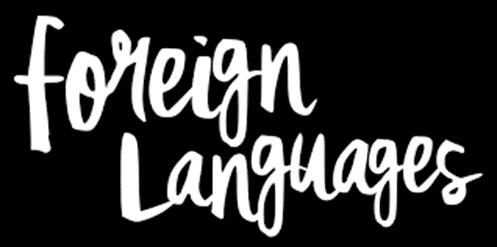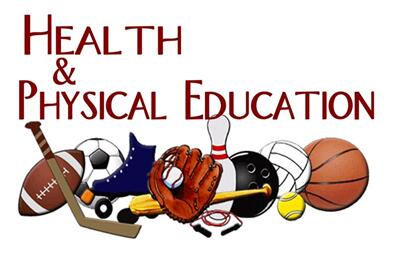Unified Arts Competencies
Communicate through Art - The ability to communicate visual ideas using a variety of media is basic to visual art expression.
Elements and Principles of Art - The ability to achieve more perspective about the art elements and principles, and their functions in works of art, is basic to understanding them.
Analyze and Evaluate Art - Successful evaluation and analysis depends on your level of understanding of time, cultural influences, meaning or purpose or artwork, intentional use of specific media, images and symbols, and the elements and principles applied.
Visual Arts Portfolio - Compiling a visual arts portfolio is essential in the preparation for post-secondary education and career opportunities in all career fields.

Creating - Students will demonstrate the ability to conceive and develop a musical idea by applying the skills and language of music to generate and refine an original musical product.
Performing - Students will demonstrate the ability to interpret, refine, and perform existing musical works by applying the skills and language of music to convey the composer’s meaning and ideas.
Responding & Connecting - Students will apply the skills and language of music to respond to musical works by evaluating the ways in which music conveys meaning and by connecting musical works to societal, cultural, and historical contexts.

Innovative Design - Students use a variety of technologies within a design process to identify and solve problems by creating new, useful or imaginative solutions.
Computational Thinking - Students develop and employ strategies for understanding and solving problems in ways that leverage the power of technological methods to develop and test solutions.
Knowledge Construction - Students critically curate a variety of resources using digital tools to construct knowledge, produce creative artifacts and make meaningful learning experiences for themselves and others.
Communication & Collaboration - Students use digital media and environments to communicate and work collaboratively, including at a distance, to support individual learning and contribute to the learning of others.
Digital Citizenship & Technology Operations - Students demonstrate a sound understanding of technology concepts, systems, and operations and understand human, cultural, and societal issues related to technology and practice legal and ethical behavior.
Analyze and Interpret – Demonstrate ability to analyze information based on tangible results.
Communicate – Demonstrate communication skills through written, visual, and social context.
Problem Solve – Demonstrate problem solving and critical thinking skills using the design process and mathematical equations.
Technology Proficiency – Demonstrate knowledge of computer technologies through the use of Computer Aided Design and related software.
Analyze and Interpret – Demonstrate ability to analyze information based on tangible results.
Communicate – Demonstrate communication skills through written, visual, and social context.
Problem Solve – Demonstrate problem solving and critical thinking skills using the design process and mathematical equations.
Technology Proficiency – Students will demonstrate the knowledge of computer technologies through the use of coding and related software.
Innovative Design - Students use a variety of technologies within a design process to identify and solve problems by creating new, useful or imaginative solutions.
Computational Thinking - Students develop and employ strategies for understanding and solving problems in ways that leverage the power of technological methods to develop and test solutions.
Knowledge Construction - Students critically curate a variety of resources using digital tools to construct knowledge, produce creative artifacts and make meaningful learning experiences for themselves and others.
Communication & Collaboration - Students use digital media and environments to communicate and work collaboratively, including at a distance, to support individual learning and contribute to the learning of others.
Digital Citizenship & Technology Operations - Students demonstrate a sound understanding of technology concepts, systems, and operations and understand human, cultural, and societal issues related to technology and practice legal and ethical behavior.
Innovative Design - Students use a variety of technologies within a design process to identify and solve problems by creating new, useful or imaginative solutions.
Computational Thinking - Students develop and employ strategies for understanding and solving problems in ways that leverage the power of technological methods to develop and test solutions.
Knowledge Construction - Students critically curate a variety of resources using digital tools to construct knowledge, produce creative artifacts and make meaningful learning experiences for themselves and others.
Communication & Collaboration - Students use digital media and environments to communicate and work collaboratively, including at a distance, to support individual learning and contribute to the learning of others.
Digital Citizenship & Technology Operations - Students demonstrate a sound understanding of technology concepts, systems, and operations and understand human, cultural, and societal issues related to technology and practice legal and ethical behavior.
Analyze & Interpret - Demonstrate ability to analyze and interpret information about the physical world based on tangible results.
Communicate - Demonstrate communication skills in written, diagrammatical, and shown by example formats through collaborative team based and individual project activity.
Problem Solve - Demonstrate problem solving and critical thinking skills using the design process, time/project management, and computational thinking.
Technology Proficient - Demonstrate knowledge of hand tools, powered hand tools, and powered shop tools, through active hands on use.

Vocabulary & Grammar – Thematic vocabulary acquisition, an understanding of semantics, correct grammatical and syntactical structures are necessary for the production, interpretation and the development of world language.
Speaking & Writing – The ability to communicate effectively in writing and in speaking is essential to acquiring levels of proficiency in the target language.
Culture – Knowledge of cultural similarities and differences is an integral part of learning a world language.
Listening & Reading Comprehension – Ability to gather and comprehend information from authentic language materials within a familiar context is necessary to develop basic reading and listening skills.

Concepts Related to Health - Students will comprehend concepts related to health promotion and disease prevention to enhance health.
Accessing Health Information - Students will analyze the influence of family, peers, culture, media, technology, and other factors on health behaviors.
Analyzing Internal & External Influences - Students will demonstrate the ability to use interpersonal communication skills to enhance health and avoid or reduce health risks.
Physical Learning - Students will be able to understand, assess, demonstrate, and apply basic motor skills, rules, and strategies to sports specific activities and fitness.
Safety and Cooperation - Students will be able to recognize and apply proper safety techniques to ensure a positive and safe learning environment.
